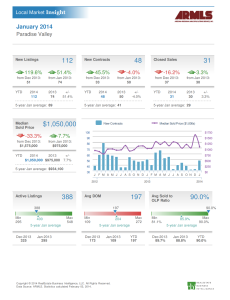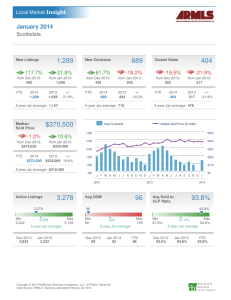 By Joe Szabo, Scottsdale Real Estate Team
Buyers spend a lot of time looking at properties online, touring homes on the Sunday open house circuit, and talking to their real estate agent. They’re laser-focused on finding the best home that meets their needs. The problem is, buyers sometimes don’t take the long view of a property. They’re only looking at a home as a potential buyer — and not as someone who, years down the road, may also have to sell the property. Given that homes are such a big investment, there should be a little inside your head, picking away at your options and decisions.
As the home buying market starts to heat up again, here are ten things you should consider when choosing your next home.
By Joe Szabo, Scottsdale Real Estate Team
Buyers spend a lot of time looking at properties online, touring homes on the Sunday open house circuit, and talking to their real estate agent. They’re laser-focused on finding the best home that meets their needs. The problem is, buyers sometimes don’t take the long view of a property. They’re only looking at a home as a potential buyer — and not as someone who, years down the road, may also have to sell the property. Given that homes are such a big investment, there should be a little inside your head, picking away at your options and decisions.
As the home buying market starts to heat up again, here are ten things you should consider when choosing your next home.
10 Things That Make a Home a Good Home By Joe Szabo, Scottsdale Real Estate Team
 By Joe Szabo, Scottsdale Real Estate Team
Buyers spend a lot of time looking at properties online, touring homes on the Sunday open house circuit, and talking to their real estate agent. They’re laser-focused on finding the best home that meets their needs. The problem is, buyers sometimes don’t take the long view of a property. They’re only looking at a home as a potential buyer — and not as someone who, years down the road, may also have to sell the property. Given that homes are such a big investment, there should be a little inside your head, picking away at your options and decisions.
As the home buying market starts to heat up again, here are ten things you should consider when choosing your next home.
By Joe Szabo, Scottsdale Real Estate Team
Buyers spend a lot of time looking at properties online, touring homes on the Sunday open house circuit, and talking to their real estate agent. They’re laser-focused on finding the best home that meets their needs. The problem is, buyers sometimes don’t take the long view of a property. They’re only looking at a home as a potential buyer — and not as someone who, years down the road, may also have to sell the property. Given that homes are such a big investment, there should be a little inside your head, picking away at your options and decisions.
As the home buying market starts to heat up again, here are ten things you should consider when choosing your next home.


 By
By  By
By 


 By
By 





